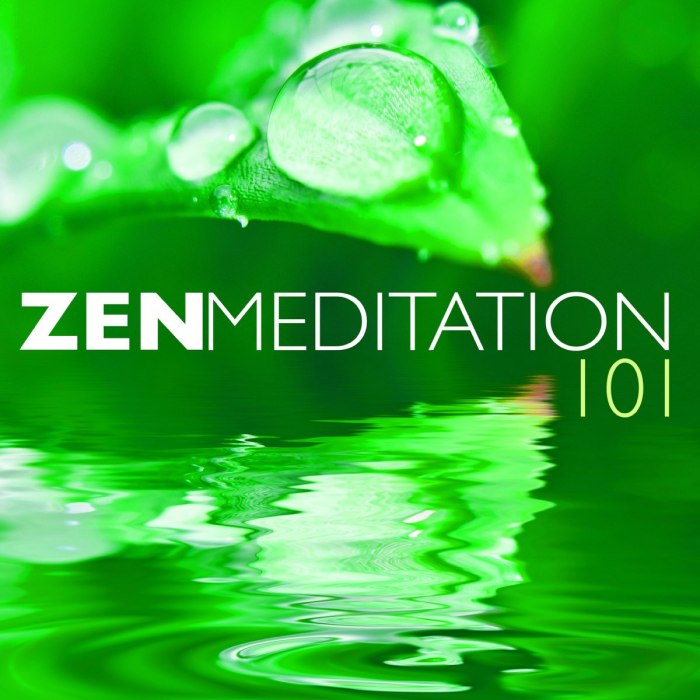Embark on a journey into the world of zen meditation, where tranquility and self-discovery await. Explore the essence of this ancient practice that brings harmony to mind, body, and spirit.
Discover the profound benefits, techniques, and practical ways to integrate zen meditation into your daily life for a more balanced and centered existence.
What is Zen Meditation?

Source: innertravel.org
Zen meditation, also known as Zazen, is a form of meditation that originated in China during the Tang dynasty and later spread to Japan. It is a key practice in Zen Buddhism, focusing on mindfulness and self-awareness.
Core Principles and Beliefs
- Zen meditation emphasizes the direct experience of enlightenment or awakening, known as Satori, through rigorous practice.
- Practitioners aim to cultivate a deep sense of presence and awareness by sitting in a specific posture, usually cross-legged, and focusing on their breath or a simple mantra.
- One of the core beliefs of Zen meditation is the concept of non-duality, the idea that all things are interconnected and part of a unified whole.
- Through meditation, individuals seek to transcend the limitations of the ego and experience a profound sense of interconnectedness with all beings and phenomena.
Role in Spiritual Practice
Zen meditation plays a central role in the spiritual practice of Zen Buddhism, providing a path to self-realization and enlightenment. By quieting the mind and letting go of attachments, practitioners aim to uncover their true nature and awaken to the present moment.
Benefits of Zen Meditation

Source: saludterapia.com
Zen meditation offers a wide range of physical and mental benefits that can enhance overall well-being and quality of life. Through regular practice, individuals can experience improvements in various aspects of their health and mindset.
Physical Benefits
- Improves cardiovascular health by reducing blood pressure and lowering the risk of heart disease.
- Enhances immune system function, making the body more resilient to illnesses.
- Reduces chronic pain and inflammation by promoting relaxation and reducing stress levels.
- Increases energy levels and vitality, leading to a greater sense of physical well-being.
Mental Benefits
- Reduces anxiety and stress by calming the mind and promoting a sense of inner peace.
- Enhances focus and concentration, improving productivity and cognitive performance.
- Promotes emotional resilience and self-awareness, allowing individuals to manage their emotions effectively.
- Boosts creativity and intuition by fostering a clear and centered state of mind.
Personal Experience
Personally, I have found that practicing Zen meditation has helped me to cope with daily stressors more effectively. It has allowed me to maintain a sense of calm and clarity even in challenging situations, improving my overall mental well-being.
Scientific Studies
Research studies have shown that regular Zen meditation practice can lead to positive changes in brain structure and function. These changes are associated with improved mood regulation, reduced anxiety, and enhanced cognitive abilities.
Techniques of Zen Meditation

Source: mzstatic.com
Zen meditation, also known as Zazen, involves various techniques to help practitioners cultivate mindfulness and focus. These techniques are designed to help individuals quiet the mind and connect with the present moment.
Breath Awareness
One common technique used in Zen meditation is breath awareness. Practitioners focus on the sensation of their breath as it enters and exits the body. This helps to anchor the mind and bring awareness to the present moment.
Mindfulness
Mindfulness is another key technique in Zen meditation. Practitioners are encouraged to observe their thoughts and emotions without judgment, allowing them to cultivate a sense of awareness and acceptance.
Posture
Posture plays a crucial role in Zen meditation. Practitioners sit in a stable and comfortable position, often with their legs crossed and spine straight. This posture helps to promote alertness and focus during meditation.
Step-by-Step Guide to Zen Meditation
- Find a quiet and comfortable place to sit.
- Sit in a stable position with your legs crossed and spine straight.
- Close your eyes and focus on your breath, feeling the sensation as you inhale and exhale.
- Observe any thoughts or emotions that arise without attachment, letting them pass by like clouds in the sky.
- Continue to breathe mindfully, bringing your awareness back to the present moment whenever your mind wanders.
- Practice for a few minutes to start and gradually increase the duration as you become more comfortable with the practice.
Zen Meditation in Daily Life

Source: antonimartinezpsicologo.com
Integrating Zen meditation practices into your daily routine can have a profound impact on your overall well-being. By incorporating mindfulness and presence into your daily activities, you can effectively manage stress and cultivate a sense of inner peace.
Incorporating Zen Meditation into Daily Routines
Here are some tips on how to incorporate Zen meditation into your daily life:
- Start your day with a short meditation session to set a positive tone for the rest of the day.
- Practice mindfulness while performing daily tasks such as washing dishes, walking, or eating. Focus on the present moment and let go of distractions.
- Create a designated meditation space in your home where you can retreat to for moments of quiet reflection.
Impact of Zen Meditation on Stress Management
Zen meditation can be a powerful tool for managing stress and anxiety. By cultivating a sense of inner peace and calm through regular practice, you can learn to navigate life’s challenges with greater ease and resilience.
Tips for Beginners
- Start with short meditation sessions and gradually increase the duration as you become more comfortable with the practice.
- Focus on your breath as a point of anchor during meditation to help bring your attention back to the present moment.
- Be patient with yourself and approach meditation with an open mind and heart, without judgment or expectations.
Last Recap

Source: thuthuatphanmem.vn
As we conclude our exploration of zen meditation, remember that this practice offers a gateway to serenity amidst the chaos of modern life. Embrace the peace within and let zen guide you on a path of mindfulness and well-being.